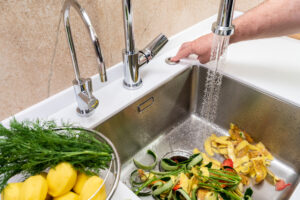Avoid These Main Causes of Clogged Drains in Northern VA
 Clogged drains are a common and frustrating problem. Anything besides waste and toilet paper, including soap, food, and grease, can build up and cause blockages. Using your garbage disposal helps, but not everything belongs in it.
Clogged drains are a common and frustrating problem. Anything besides waste and toilet paper, including soap, food, and grease, can build up and cause blockages. Using your garbage disposal helps, but not everything belongs in it.
Understanding what causes clogs and how to prevent them can save you time, money, and stress. Here are eight common culprits and how to avoid them:
Hard, Fibrous & Starchy Foods
Some foods can easily clog your kitchen drain. Hard, stringy, or starchy foods don’t break down well and can block your pipes. They can also jam garbage disposal blades or turn into a sticky paste that gets stuck inside your drain.
Common foods that clog the drains include:
- Eggshells
- Coffee grounds
- Potato peels
- Celery and corn husks
- Pasta and rice
Hair
Hair is one of the biggest causes of clogged showers and sink drains. It easily binds with soap and other debris, forming tough clumps that slow or completely block water flow.
Prevent hair clogs by:
- Using a drain cover or hair catcher in sinks, showers, and tubs
- Removing trapped hair from drain covers regularly
- Brushing your hair before showering
Soap Scum & Residue
Soap might seem harmless, but over time, it combines with minerals in water to form a sticky residue called soap scum. This buildup narrows pipes, leading to slow drains and blockages.
We recommend:
- Using body wash instead of bar soap, which contains more fats
- Installing a water softener to reduce mineral buildup
- Cleaning your drains regularly with hot water and vinegar
Fat, Oil & Grease
Pouring grease down the drain might seem like no big deal, but it’s a common cause of clogs. Even though grease, oil, and fat go in as liquids, they harden as they cool, sticking to the inside of your pipes.
Over time, this buildup traps food and other debris, leading to slow drains or total blockages. We recommend letting these substances harden and then disposing of them in the trash.
Foreign Objects
Drains are meant for water and waste, but too often, other things end up going down them. These items can cause serious clogs:
- Wipes
- Paper towels
- Cotton swabs
- Contact lenses
- Tampons
- Small toys
Even “flushable” wipes don’t break down like toilet paper and can block your pipes over time.
Tree Root Intrusion
Tree roots are always searching for water, and unfortunately, your underground pipes provide the perfect source. Small cracks or loose joints in your sewer line can let roots sneak in, and once inside, they grow quickly, blocking the water flow. Over time, this can lead to slow drains, backups, and even major pipe damage.
You should be mindful of where you plant trees near your home and schedule a sewer line inspection if you suspect tree root intrusion.
Mineral Deposits
If you have hard water, minerals like calcium and magnesium can build up inside your pipes. Over time, this buildup makes it harder for water to flow and can lead to clogs.
If you see white, chalky residue on your faucets or showerheads, the same thing is happening inside your pipes. You should use a water softener to reduce mineral buildup and routinely flush your drains with vinegar and hot water.
Excess Toilet Paper
Toilet paper is made to break down in water, but using too much at once can overwhelm your plumbing. Large amounts of toilet paper can bunch up, creating a blockage that slows flushing or completely clogs your toilet.
Thick, ultra-soft toilet paper can worsen the problem by taking longer to dissolve. To avoid this issue, you should use as little toilet paper as possible.
Contact Len The Plumber Heating & Air To Address Drain Clogs
A clogged drain can be a big hassle, but we’re here to help. Len The Plumber Heating & Air offers 24/7 emergency repair, so you don’t have to wait. With over 25 years of experience, our team knows how to fix any drain problem quickly.
If you’re dealing with a clogged drain, don’t wait for it to get worse. Contact Len The Plumber Heating & Air to schedule drain cleaning in Northern Virginia.
From Len The Plumber Heating & Air
 Coupons
Coupons 

